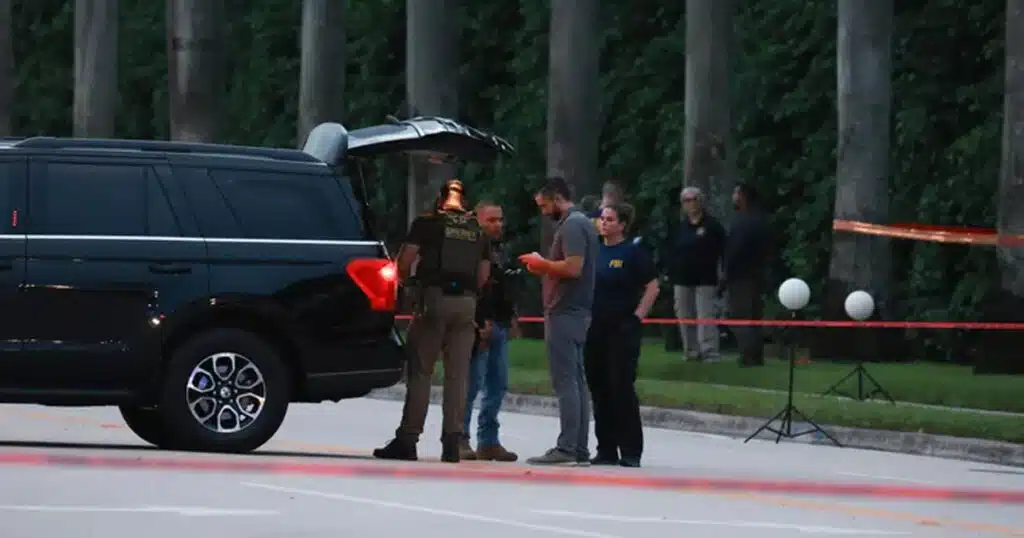
VANCE: The Short Road From Censorship To Violence
Yesterday, Donald J. Trump nearly lost his life. An armed gunman waited for him in the bushes. He brought a go-pro camera to record it. A secret service agent spotted the barrel of a gun through a fence and shot at the gunman. The gunman fled. He was caught. And now we slowly learn about him and his motive.
President Trump is my running mate, and my friend, but he is more importantly a father and grandfather to people who love him very much. I want him to have many more years with his family. (And selfishly, I’d like many more with my own.)
I admire the president for calling for peace and calm. The rhetoric is out of control. It nearly got Steve Scalise and many others killed a few years ago. It nearly got Donald Trump killed twice. But I want to say something about yesterday’s news, and how it illuminates the difference between vigorous debate and violent rhetoric.
Here is what we know so far: Kamala Harris has said that “Democracy is on the line” in her race against President Trump. The gunman agreed, and used the exact same phrase. He had a Kamala Harris bumper sticker on his truck. He was obsessed with Ukraine’s “fight for Democracy” and absorbed many unhinged views about the Russia-Ukraine war. HIs name is Ryan Routh, and he donated 19 times to Democrat causes and zero to Republican ones.
How do you think the Democrats and their media allies would respond if a 19-time Republican donor tried to kill a Democratic official? It’s a question that answers itself. For years, Kamala Harris’s campaign surrogates have said things like “Trump has to be eliminated.” And how have their media allies responded to the second assassination attempt on Donald Trump in as many months?
NBC News called the attempted assassination a “golf club incident.” The LA Times told us “Trump Targeted at Golf Club.” The USA Today’s top of the fold headline is “Hope in America,” and they published a preposterous letter to the editor arguing that Trump “brings these assassination attempts on himself.” CNN’s Dana Bash–who just yesterday bizarrely accused me of inciting a bomb threat–said today that Harris campaign rhetoric didn’t motivate Routh even though he echoed their rhetoric explicitly.
PBS’s weekend show perfectly illustrates the double standard of Kamala Harris’s media friends. After spending 30 seconds on the second assassination attempt on President Trump, they then focused on the real danger: me and President Trump, who are, according to them, personally responsible for bomb threats against Springfield. Of course, I repeatedly condemend those threats. And reports today suggest they came from a foreign country, not–as the media suggested–a deranged Trump fan.
The double standard is breathtaking. Donald Trump and I are, by their account, directly responsible for bomb threats from foreign countries. Why? Because we had the audacity to repeat what residents told us about the problems in their town. Meanwhile, Harris allies call for Trump to be eliminated as the media publishes arguments that he deserved to be shot.
This seems like a double standard. But at a deep level, it is entirely consistent.
Consider Springfield. Citizens are telling us that there are problems. These include the undeniable truths of higher car accidents, unaffordable housing, evictions of residents, overcrowded hospitals, overstressed schools, and rising rates of disease. They also include the infamous pet stories–which, again, multiple people have spoken about (either on video or to me or my staff).
Kamala Harris’s first strategy was to ignore these people and their concerns. Yes, she had prevented the deportation of millions of illegal aliens, and some of them made their way to Springfield. But it was a small town with no voice. Some of the local leadership even loved the cheap labor. So the suffering of thousands of American citizens went ignored.
Their next move with these stories is censorship. In Springfield, a psychopath (or a foreign government) calls in a bomb threat, so they blame that on President Trump (and me). The threat of violence is disgraceful of course, yet the media seems to relish it. They cover a bomb threat, but not the rise in murders. They cover the threat, but not the HIV uptick. They cover the threat, not the schools overwhelmed with new kids who don’t speak English. They cover the threat, not rising insurance rates or the car accidents that caused them. They cover the threat, not the failures of Kamala Harris’s leadership.
The purpose is not to turn down the rhetoric. If anything, covering the bomb threats gives whoever makes them exactly what he wants: attention. The purpose is distraction and shame. How dare you talk about the problems of Haitian migration in Springfield? You’re endangering people, simply by discussing the problems of Kamala Harris’s policies. It’s a form of moral blackmail, designed not to make anyone safe but to shut everyone up.
Springfield is the most recent, but hardly the most egregious example. There was the Hunter Biden laptop story, censored by BigTech. And who can forget that anyone who didn’t support Kamala Harris’s Ukraine policy was drenched in the blood of Ukrainian children. That last one appears to have had some effect on Routh–the most recent would-be assassin. The message is always the same: don’t you dare express an opinion on the public affairs of your nation. The message is: shut up.
This is the difference between debate–even aggressive debate–and censorship. It is one thing to attack Kamala Harris for “destroying the country” and quite another to say that President Trump should be “eliminated.” It is one thing to criticize overheated rhetoric, and another to say that a former president has invited an assassination on himself. It is one thing to say that Donald J. Trump’s arguments about the election of 2020 are wrong; it is another thing to attempt to remove him from the ballot over it.
It is one thing to say that pets are not, in fact being eaten, and another thing to say that anyone who disagrees is trying to murder people. Dissent, even vigorous dissent, is a great tradition of the United States. Censorship is not.
For the next 7 weeks of this campaign, I will vigorously defend your right to speak your mind. I believe you have every right to criticize me and Donald J. Trump, even if you say terrible or untrue things about us. But when I ask you to “tone down the rhetoric” it’s not about being nice–our citizens have every right to be mean, even if I don’t like it–or empty platitudes.
Instead, I’m asking all of us to reject censorship. Reject the idea that you can control what other people think and say. Embrace persuasion of your fellow citizens over silencing them–either through the powers of Big Tech or through moral blackmail.
I think this will make our public debate much better. But there’s something else. Reject censorship and you reject political violence. Embrace censorship, and you will inevitably embrace violence on its behalf.
The reason is simple. The logic of censorship leads directly to one place, for there is only one way to permanently silence a human being: put a bullet in his brain.



